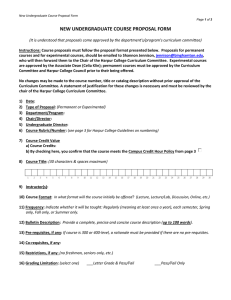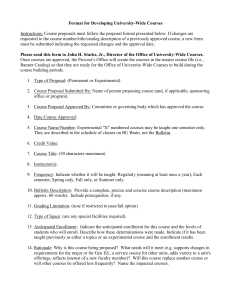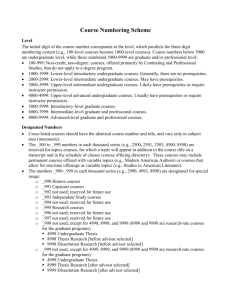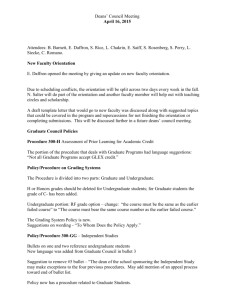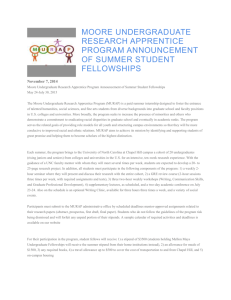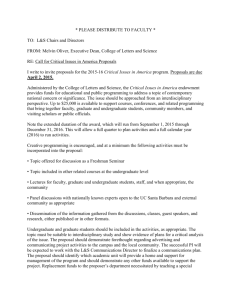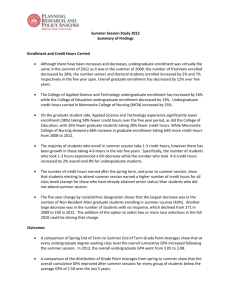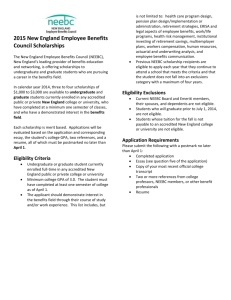Course Proposal Guidelines
advertisement
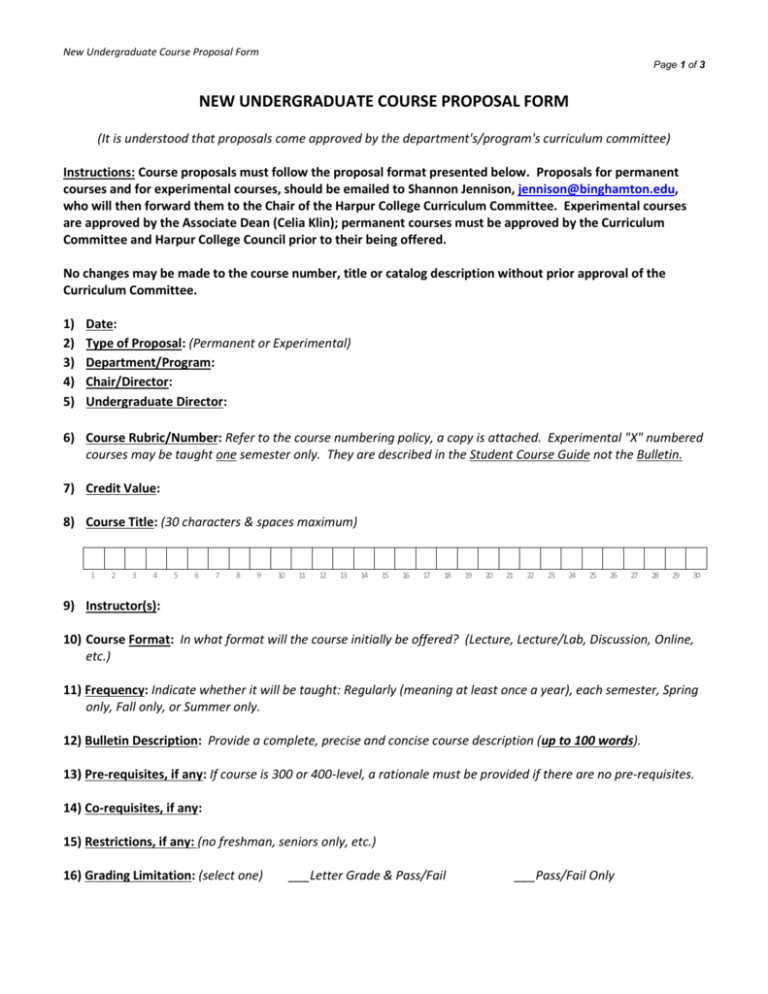
New Undergraduate Course Proposal Form Page 1 of 3 NEW UNDERGRADUATE COURSE PROPOSAL FORM (It is understood that proposals come approved by the department's/program's curriculum committee) Instructions: Course proposals must follow the proposal format presented below. Proposals for permanent courses and for experimental courses, should be emailed to Shannon Jennison, jennison@binghamton.edu, who will then forward them to the Chair of the Harpur College Curriculum Committee. Experimental courses are approved by the Associate Dean (Celia Klin); permanent courses must be approved by the Curriculum Committee and Harpur College Council prior to their being offered. No changes may be made to the course number, title or catalog description without prior approval of the Curriculum Committee. 1) 2) 3) 4) 5) Date: Type of Proposal: (Permanent or Experimental) Department/Program: Chair/Director: Undergraduate Director: 6) Course Rubric/Number: Refer to the course numbering policy, a copy is attached. Experimental "X" numbered courses may be taught one semester only. They are described in the Student Course Guide not the Bulletin. 7) Credit Value: 8) Course Title: (30 characters & spaces maximum) 1 2 3 4 5 6 7 8 9 10 11 12 13 14 15 16 17 18 19 20 21 22 23 24 25 26 27 28 29 30 9) Instructor(s): 10) Course Format: In what format will the course initially be offered? (Lecture, Lecture/Lab, Discussion, Online, etc.) 11) Frequency: Indicate whether it will be taught: Regularly (meaning at least once a year), each semester, Spring only, Fall only, or Summer only. 12) Bulletin Description: Provide a complete, precise and concise course description (up to 100 words). 13) Pre-requisites, if any: If course is 300 or 400-level, a rationale must be provided if there are no pre-requisites. 14) Co-requisites, if any: 15) Restrictions, if any: (no freshman, seniors only, etc.) 16) Grading Limitation: (select one) ___Letter Grade & Pass/Fail ___Pass/Fail Only New Undergraduate Course Proposal Form Page 2 of 3 17) Anticipated Enrollment: Indicate the anticipated enrollment for this course and the levels of students who will enroll. Describe how these determinations were made. Indicate if it has been taught previously as either a topics or an experimental course and the enrollment results. 18) Rationale: Why is this course being proposed? What needs will it meet (e.g. supports changes in requirements for the major or for Gen Ed., a service course for other units, adds variety to a unit's offerings, reflects interest of a new faculty member)? Will this course replace another course or will other courses be offered less frequently? Name the impacted courses. 19) Relationship to Existing Courses/Programs/Disciplinary Developments: What is its relation to requirements of the department? What is its relationship to current developments within the discipline? Does it complement, overlap, or compete with existing coursework in other programs? 20) Relationship to Graduate Program: Indicate whether this course will be taught simultaneously as an undergraduate and graduate course; and, if so, what differences will exist between the undergraduate and graduate versions (Note: the Graduate Council must approve all graduate courses). 21) Exceptional budgetary or resource requirements: (funds, staff support, library, computer use, laboratory needs) associated with this course; if none, provide a statement to that effect. Provide a statement of department's means of meeting those exceptional needs. 22) Human Subjects Research: Does the proposed course involve human subjects research? (Types of activities involving human subjects include: interviews, questionnaires, or observations, etc.) If so, students must be advised to obtain permission from the University's Human Subjects Research Review Committee prior to commencing research. (1/28/16) New Undergraduate Course Proposal Form Page 3 of 3 UNDERGRADUATE COURSE NUMBERING SYSTEM HARPUR COLLEGE 100 - 199 Introductory Courses, normally with no prerequisites, open to all students 200 - 299 Lower division, intermediate courses with or without prerequisites 300 - 399 Upper division, intermediate courses, normally with prerequisites 400 - 499 Upper division, advanced courses with specific course prerequisites OTHER GENERAL GUIDELINES * The 80's range of numbers at each level is reserved for special topics. * The 90's range at each level is reserved for: 91 Teaching Practica 95 Internship 97 Independent Study 98 - 99 Honors/Thesis * Cross listed courses must be consistent by level, i.e. upper level with upper level and lower level with lower level. NOTE: Harpur College experimental or permanent course approval differs from that needed to designate a course as satisfying a General Education requirement. Gen Ed approvals are handled by the University Undergraduate Curriculum Committee. Guidelines, submission form and FAQ can be found on the General Education website.
